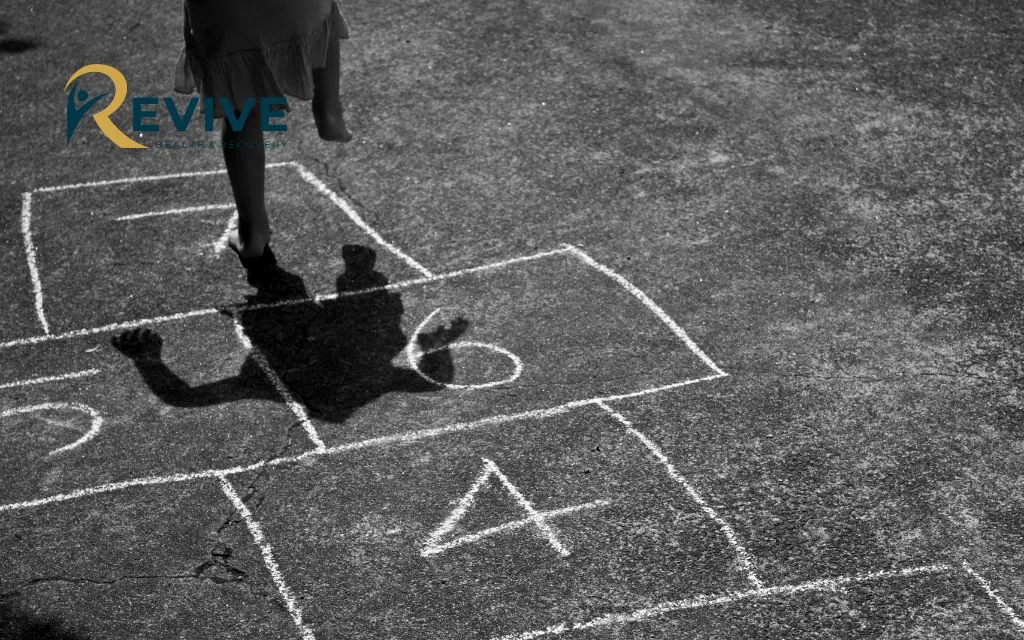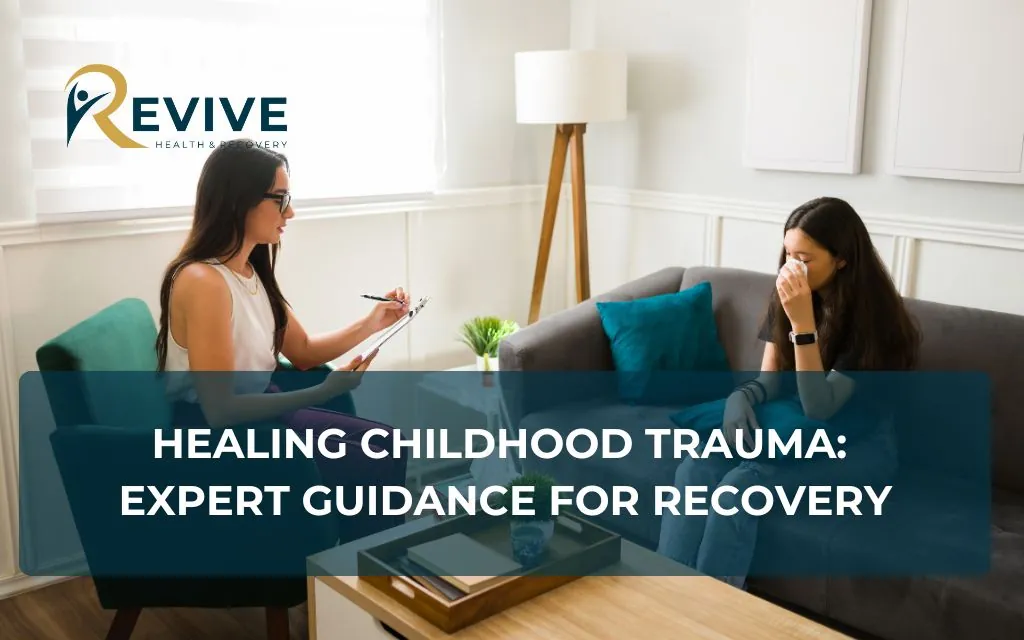When childhood trauma remains unaddressed, it can affect every aspect of adult life. From relationships to career choices to physical health, the impact extends far beyond what many realize. At Revive Health Recovery, we understand the complexity of trauma recovery and offer evidence-based approaches to help Denver residents move from surviving to thriving.
Understanding Childhood Trauma and Why Healing Matters
What is Childhood Trauma? (Adverse Childhood Experiences – ACEs)
Childhood trauma encompasses adverse childhood experiences (ACEs) including physical abuse, emotional neglect, witnessing violence, parental substance abuse, or family mental illness. According to the Substance Abuse and Mental Health Services Administration (SAMHSA), more than two-thirds of children experience at least one traumatic event by age 16. Here in Denver, ACEs affect residents across all socioeconomic backgrounds, creating a city-wide need for trauma-informed care.
These experiences fundamentally alter developing brains, creating patterns that can persist into adulthood without proper intervention.
Long-Term Effects on Mental and Physical Health
Unresolved childhood trauma manifests in numerous ways:
- Post-traumatic stress disorder (PTSD) symptoms like flashbacks and hypervigilance
- Depression and anxiety disorders
- Attachment difficulties and relationship problems
- Behavioral challenges including substance use disorders
For a broader overview, check out Psychology Today’s guide to trauma and its effects on mental health.
What many don’t recognize is the physical toll: research shows chronic stress from childhood trauma triples the risk of hypertension, heart disease, and autoimmune disorders. In Denver specifically, mental health providers report significant correlation between childhood trauma histories and current physical health complaints among patients.

Why Denver Residents Need Healing Now
Denver faces unique challenges with trauma prevalence. While national statistics show 1 in 7 children face abuse annually, Denver’s diverse population requires culturally responsive care addressing varied traumatic experiences. As our city grows, so does the need for trauma-informed services that acknowledge different cultural perspectives on mental health.
The good news? Denver offers research-backed treatment options that work.
Proven Therapies for Healing Childhood Trauma in Denver
Creative Healing: Art and Narrative Therapy
Art therapy for childhood trauma offers alternative pathways for expression when words feel insufficient. Through painting, sculpture, or drawing, clients externalize internal experiences and process difficult emotions. Several Denver art therapists specialize in trauma recovery, providing safe spaces for this healing work.
Discover more about art therapy for trauma survivors and its transformative benefits.
Narrative therapy for trauma helps individuals separate themselves from problem-saturated stories and develop new narratives. This approach recognizes people as experts in their own lives while acknowledging trauma’s impact without defining identity. Denver therapists increasingly incorporate these approaches into comprehensive treatment plans.
Somatic and Specialized Approaches
Denver offers several specialized trauma treatments:
- Child-Parent Psychotherapy (CPP): Available through the Denver Child Advocacy Center, this approach strengthens the caregiver-child relationship after trauma.
- Brainspotting: This therapy locates points in a person’s visual field that help access unprocessed trauma.
- Internal Family Systems (IFS): Works with different parts of self that developed in response to trauma.
These specialized approaches address different aspects of trauma, creating comprehensive healing opportunities for Denver residents.

Denver Resources for Trauma Recovery
Workshops for Healing Childhood Trauma in 2025
Several start healing childhood trauma with therapist Denver options exist through workshops that provide both education and practical skills:
- Virtual Workshops: Therapist Megan McGlover offers monthly trauma recovery workshops throughout 2025 that Denver residents can join online.
- Denver Child Advocacy Center: Provides periodic workshops on childhood trauma recovery and parenting after trauma.
- Revive Health Recovery Workshops: Our center offers specialized trauma recovery workshops incorporating evidence-based approaches in a supportive group setting.
These workshops for childhood trauma healing Denver provide both community connection and structured recovery work.
Support Groups and Community Programs
Healing often accelerates in community settings. Denver offers several trauma-focused support groups:
- Adult Survivors of Childhood Trauma: Weekly meetings in central Denver provide peer support.
- Trauma Recovery Network: Offers free and reduced-cost trauma therapy following community crises.
- Revive Health Recovery Groups: Our specialized trauma recovery groups combine professional facilitation with peer support.
For more insights on trauma types and recovery, explore NCTSN’s resources on child trauma.
Denver’s trauma prevalence statistics underscore the importance of these community resources, with approximately 61% of adults reporting at least one ACE in their history.
Self-Help Strategies to Support Your Healing
Best Books for Healing Childhood Trauma in 2025
While professional support remains essential, these books on healing childhood trauma supplement therapy:
- “The Body Keeps the Score” by Bessel van der Kolk: Explains trauma’s biological impact and evidence-based treatments.
- “Healing the Child Within” by Charles Whitfield: Pioneering work on inner child healing.
- “CPTSD: From Surviving to Thriving” by Pete Walker: Practical guide for complex trauma recovery.
- “It Didn’t Start With You” by Mark Wolynn: Explores intergenerational trauma transmission.
- “What Happened to You?” by Bruce Perry and Oprah Winfrey: Accessible explanation of trauma’s developmental impact.
Denver bookstores like Tattered Cover often feature these titles in their psychology sections, and Denver Public Library maintains copies for borrowing.
Inner Child Work: Reconnect and Heal
Inner child work represents a fundamental aspect of trauma recovery, addressing the wounded younger self who experienced trauma. Denver therapists often incorporate techniques such as:
- Visualization exercises: Imagining your adult self comforting your child self during traumatic memories.
- Letter writing: Communicating with your inner child through written dialogue.
- Empty chair work: Speaking directly to an imagined representation of your younger self.
Self-compassion forms the foundation of this work, replacing self-criticism with understanding and empathy. At Revive Health Recovery, we integrate inner child approaches into broader trauma recovery plans.
Or you can discover more about non-therapy approaches to trauma healing to complement this process.
Daily Practices for Resilience
Between therapy sessions, these practices support ongoing healing:
- Mindfulness meditation: Reduces trauma-related anxiety and improves present-moment awareness.
- Yoga and body movement: Releases trauma stored in the body.
- Journaling: Processes emotions and tracks healing progress.
- Nature connection: Denver’s proximity to mountains offers powerful healing environments.
Consistent implementation of these practices creates neurobiological changes that counteract trauma’s effects.

From Healing to Thriving: Life Beyond Trauma
Setting Goals for Emotional Wellness
As trauma symptoms subside, many clients begin focusing on growth-oriented goals:
- Developing healthier relationship patterns
- Exploring new interests and passions
- Setting appropriate boundaries
- Practicing authentic self-expression
- Building trauma-informed self-care routines
Recovery extends beyond symptom reduction to creating meaning and purpose after trauma.
Explore NIMH’s insights on childhood trauma effects to understand how healing can transform lives.
Maintaining Progress with Denver Support
Sustaining recovery requires ongoing support. Denver offers numerous resources for long-term wellbeing:
- Community wellness centers: Offer sliding-scale wellness programs
- Trauma-informed fitness classes: Address body-based trauma symptoms
- Continuing education workshops: Build on initial healing work
- Meditation groups: Support ongoing mindfulness practice
Revive Health Recovery provides aftercare planning to ensure continued progress following initial treatment.
Start Your Healing Journey in Denver Today
Finding a Childhood Trauma Therapist in Denver
Denver residents have access to several evidence-based trauma therapies:
- Eye Movement Desensitization and Reprocessing (EMDR): This approach helps reprocess traumatic memories to remove their emotional charge. Revive Health Recovery’s EMDR specialists report 80-90% effectiveness for treating trauma symptoms.
- Trauma-Focused Cognitive Behavioral Therapy (TF-CBT): This structured approach helps identify and modify negative thought patterns resulting from trauma.
- Dialectical Behavior Therapy (DBT): Particularly effective for emotional regulation challenges stemming from childhood trauma.
- Somatic Experiencing: Addresses how trauma remains stored in the body.
To find a qualified childhood trauma therapist in Denver, consider Revive Health Recovery’s team of trauma specialists or search the Psychology Today directory with “childhood trauma” and “Denver” filters.
Contact Revive Health Recovery for Expert Care
Ready to begin healing childhood trauma? Our Denver center specializes in trauma recovery with evidence-based approaches tailored to your unique needs.
Call us today at (303) 268-4655 to speak with a trauma specialist, or visit our website to complete our confidential intake form. Our Denver location at 1427 S Federal Blvd provides a safe, supportive environment for your healing journey.
Your Next Steps to Recovery
- Reach out: Contact a qualified trauma therapist at Revive Health Recovery
- Explore resources: Review recommended books and workshops
- Build support: Consider joining a support group
- Practice self-care: Implement daily practices for resilience
- Be patient: Recognize healing happens in stages over time
Learn how to deal with childhood trauma through practical strategies.
Recovery is possible, and it starts with a single step—reaching out for support.

Frequently Asked Questions (FAQs)
How long does healing from childhood trauma take?
Healing timeframes vary based on trauma severity, support systems, and individual factors. Most clients see meaningful improvement within 3-6 months of consistent therapy, though deeper healing often continues for 1-2 years. Revive Health Recovery offers personalized treatment plans based on your specific needs and goals.
What’s the best therapy for childhood trauma in Denver?
EMDR and Trauma-Focused CBT show the highest success rates for childhood trauma resolution in Denver. However, the “best” approach depends on your specific trauma history, preferences, and goals. Revive Health Recovery offers comprehensive assessments to determine the most effective treatment approach for you.
Can I heal without a therapist?
While self-help resources provide valuable support, professional guidance significantly increases healing success for childhood trauma. Professional treatment addresses deeper neural patterns that self-help alone often cannot reach. Revive Health Recovery offers both individual therapy and supplementary resources for comprehensive healing.
Are there affordable trauma therapy options in Denver?
Yes. Revive Health Recovery offers sliding scale rates, and several Denver community mental health centers provide trauma-informed care at reduced costs. Additionally, many therapists accept insurance for trauma treatment, and some offer payment plans for those without coverage.
How effective is EMDR for childhood trauma?
Research shows EMDR successfully resolves childhood trauma symptoms in 80-90% of clients, often in fewer sessions than traditional talk therapy. Revive Health Recovery’s EMDR specialists have extensive training in adapting this approach for various trauma types.
Conclusion
Healing childhood trauma opens possibilities for living fully rather than simply surviving. Denver offers robust resources for this journey—from specialized therapists and workshops to support groups and self-help tools. Recovery involves reconnecting with your authentic self through professional support, self-compassion, and community connection.
At Revive Health Recovery, we witness the transformation possible when trauma patterns shift. Your past experiences have shaped you, but they need not define your future. With the right support, healing awaits.
For more information on trauma recovery and mental health resources, explore our blog or contact our Denver office today at (303) 268-4655.



